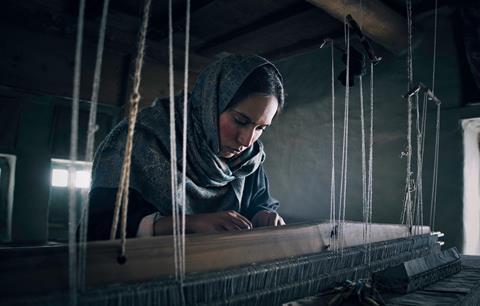A desperate wife searches for her missing husband in modern day Kashmir

Dir: Aamir Bashir. India, France Qatar. 2022. 99mins
There’s a chill in the bones of actor-turned-director Aamir Bashir’s latest film which, like his debut Autumn, highlights the impact of the “disappearance” of young men on those left behind in the conflict in disputed Kashmir. Co-written with his cinematographer Shanker Raman (who also collaborated on Autumn), the film considers the lasting damage of one such disappearance on the life of a wife who finds herself alone. The end result is a melancholic watch, whose tragic sweep might make it a tricky prospect despite a finely nuanced central performance that should ensure more festival play after its world premiere in Busan’s New Currents section.
Bashir suggests the wintry situation in Kashmir is not about to experience a thaw
Nargis (Zoya Hussein) is desperately hoping for news of her missing husband Manzoor (Manzoor Ahmand Bhat), her status as a “half widow” encapsulating the no man’s land she finds herself in. She spends money she can ill afford to bribe a policeman into helping her locate Manzoor to no avail and is unable to get help from the authorities, who view her husband as a militant. The lack of concrete news means she is also unable to move on in her personal life despite the attentions of sympathetic weaving workshop boss Yaseen (Shabir Ahmad Lone), who buys her a mobile phone which, tellingly, has a ringtone that sings, “Oh my beloved, come hither”.
Bashir draws on Greek myth when Nargis is forced to return to her village from the city and we see that, like a latter day Penelope, she is weaving his intricate kani shawl as she determinedly awaits Manzoor’s return. The phone, meanwhile, becomes an interesting intrusion of the outside world into the village as youngster Arif (Arooj Ayoub Allahi) swaps playing with his old school spinning top for watching YouTube protests and playing games on it.
As you might expect from a film written by a director and his cinematographer, the shot choices are painterly and carefully composed, whether it is the way characters are framed, so that their physical state mirrors their emotional isolation; the manner in which a window nook is used to create a distinct division of space between characters; or striking moments when Nargis’ penetrating gaze looks out directly at us.
The sound design from Vinod Subramanian and Roman Dimny is also crucial; at a moment of extreme emotion we watch Nargis physically react as the sound of barking dogs echoes in the street, while earlier the caw of crows and drum of a woodpecker highlight her loneliness. The mournful mood is fueled by the score from Naren Chandavakar and Benedict Taylor, with its use of the lute-like Rabab further cementing the sense of place. The broody silences that often replace dialogue won’t be for everyone, however, as despite the sustained mood there is only so much the actors can convey without words with some of the longer shots feeling stretched in terms of their contribution to the story.
Bashir suggests the wintry situation in Kashmir is not about to experience a thaw, as Arif proudly declares he will become a militant when he is older as that’s what boys do. The filmmaker also highlights the uncertainty of trying to live a normal life in a place where anyone can suddenly vanish with no warning. In this environment even developments which, on the face of it, ought to be optimistic, freeze almost on arrival, with Bashir suggesting the icy blast of conflict has a chilling traumatic effect on all it touches.
Production companies: Sangbaaz Films, Acrobates Films
International sales: Diversion, sales@diversion-th.com
Producer: Clare Lajoumard
Screenplay: Aamir Bashir, Shanker Raman
Cinematography: Shanker Raman
Production design: Zahoor Ahmad Najar
Editing: Shan Mohammed
Music: Naren Chandavarkar, Benedict Taylor
Main cast: Zoya Hussein, Shabir Ahmad Lone, Manzoor Ahmad Bhat, Arooj Ayoub Allahi
























